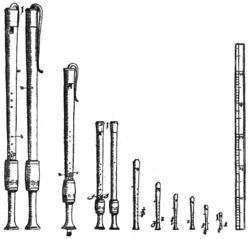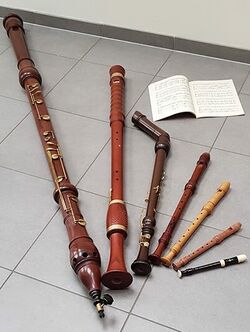Bass recorder
Topic: Engineering
 From HandWiki - Reading time: 3 min
From HandWiki - Reading time: 3 min


A bass recorder is a wind instrument in F3 that belongs to the family of recorders.
The bass recorder plays an octave lower than the alto or treble recorder. In the recorder family it stands in between the tenor recorder and C great-bass (or quart-bass) recorder.
Due to the length of the instrument, the lowest tone, F, requires a key. On modern instruments, keys may also be provided for low F♯, G, and G♯, and sometimes for C and C♯ as well.
In the early 17th century, Michael Praetorius used the diminutive term "basset" (small bass) to describe this size of recorder as the lowest member of the "four-foot" consort, in which the instruments sound an octave higher than the corresponding human voices. Praetorius calls the next-lower instrument (bottom note B♭2) a "bass", and the instrument an octave lower than the basset (with bottom note F2) a Großbaß, or "large bass".[1][2]
The bass is usually the lowest instrument of the recorder consort, but it may be used as an alto in "eight-foot" register in the so-called "great consort" or grand jeux, in which case two larger sizes of bass recorder take the lower parts and a tenor may be used as an optional descant.[3]
In popular music
In the recording of Led Zeppelin's song "Stairway to Heaven" that appears on their untitled fourth studio album, John Paul Jones played four overdubbed bass recorders.
Composer Ludwig Göransson employed a bass recorder for the opening melody of the TV series The Mandalorian. The melody features prominently throughout the series. [4]
References
- Griscom, Richard W., and David Lasocki. 2013. The Recorder: A Research and Information Guide, third edition. Routledge Music Bibliographies. Routledge. ISBN 9781135839321.
- Hunt, Edgar. 1988. "Syntagma Musicum II, Parts 1 and 2 of De Organographia by Michael Praetorius; David Z. Crookes" (review). The Galpin Society Journal 41 (October): 142–44.
- Lasocki, David. 2001. "Recorder". The New Grove Dictionary of Music and Musicians, second edition, edited by Stanley Sadie and John Tyrrell. London: Macmillan Publishers.
- Praetorius, Michael. 1619b. Syntagmatis Musici Michaelis Praetorii C. Tomus Tertius. Wolfenbüttel: Elias Holwein.
Footnotes
- ↑ Praetorius, Michael. 1619. Syntagmatis Musici Michaelis Praetorii C. Tomus Secundus De Organographia. Wolfenbüttel: Elias Holwein, in Verlegung des Autoris. p. 34, and supplement plate IX.
- ↑ Sachs, Curt. 1913. Real-Lexikon der Musikinstrumente, zugleich ein Polyglossar für das gesamte Instrumentengebiet. Berlin: Julius Bard. p. 50.
- ↑ Baines, Anthony C. 1967. Woodwind Instruments and Their History, third edition, with a foreword by Sir Adrian Boult. London: Faber and Faber. Reprinted with corrections, 1977. This edition reissued, Mineola, New York City: Dover Publications, 1991. p. 247. Reprinted again in 2012. ISBN 978-0-486-26885-9.
- ↑ "The Bass Recorder Takes Center Stage". 18 February 2021. https://hub.yamaha.com/winds/wood/bass-recorder/.
Template:Flutes Template:Renaissance music
 |
 KSF
KSF